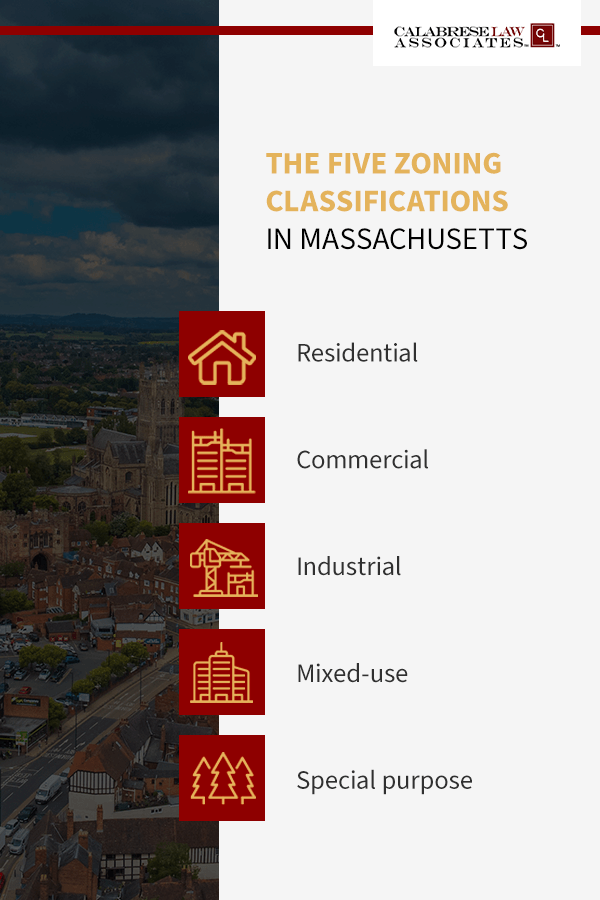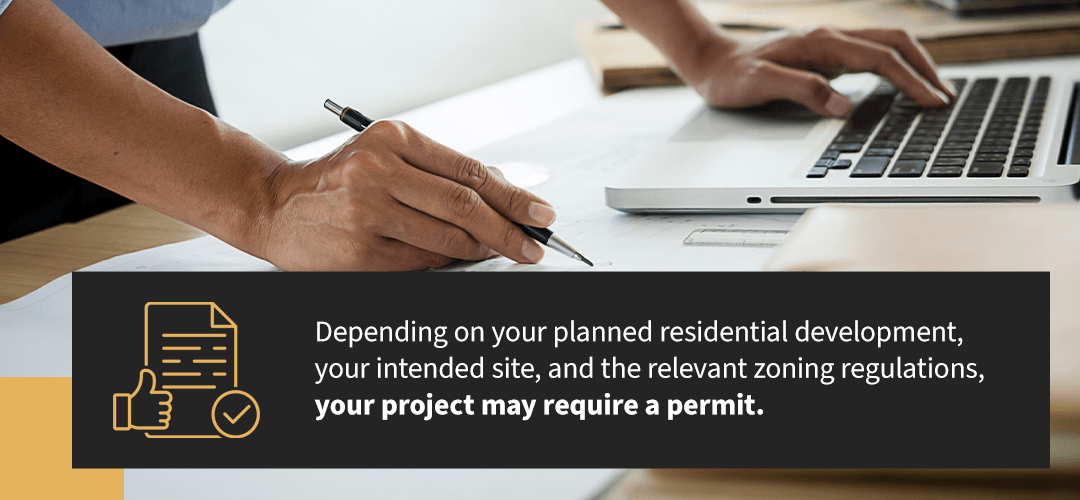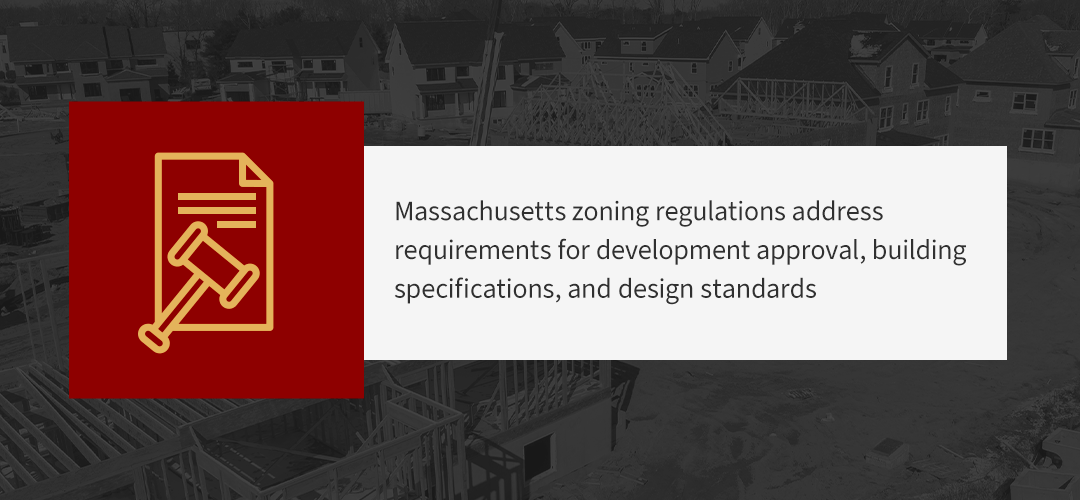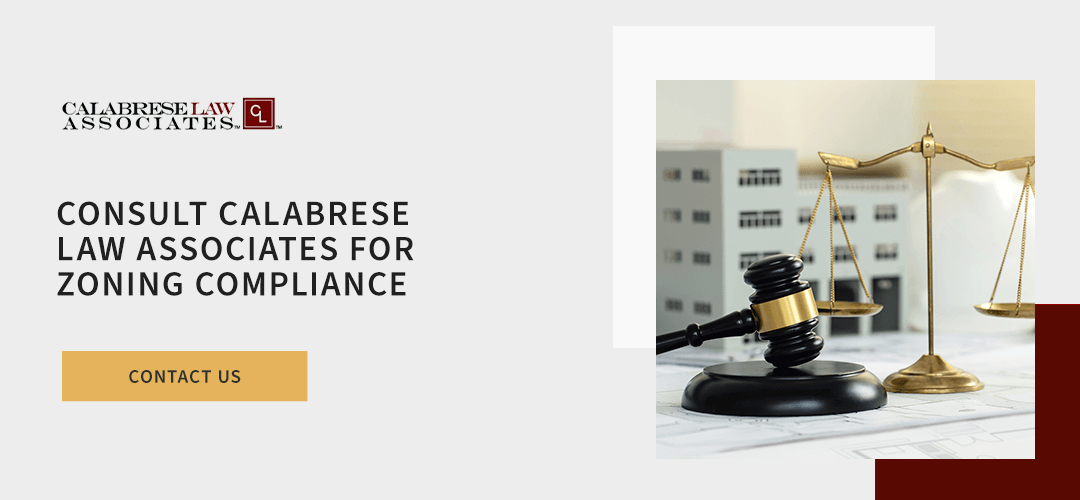If you’re planning a new residential development in Massachusetts, aligning your project with local zoning laws is crucial to ensure it can go ahead. While zoning regulations can seem confusing and intimidating, they exist to organize property developments for the benefit of everyone’s health, safety, and well-being. Knowing a few basics can help you navigate the residential zoning laws applicable to your development for a compliant and successful project.
What Is Residential Development Land Zoning?
Land zoning is a system of regulations defining the allowed uses for sections of land. Some zones are set aside for specific types of residential developments, like single-family homes, multifamily dwellings, and apartment complexes. Land zoning for residential development refers to these zones and the regulations applicable to them. Each municipality in Massachusetts may establish and enforce its own bylaws and zoning ordinances, including zoning regulations for residential developments.
The Five Zoning Classifications in Massachusetts
Massachusetts recognizes five main zoning classifications based on land use. These are:
- Residential: These areas are reserved for single-family, multifamily, and apartment homes.
- Commercial: These zones are designated for businesses, restaurants, stores, and other enterprises.
- Industrial: These accommodate industrial uses such as manufacturing and warehousing.
- Mixed-use: These zones support multiple uses, typically commercial and residential, on the same property.
- Special purpose: A few zones are dedicated to special uses, such as conservation, historic preservation, or agriculture.
A residential development must fall within a residential or mixed-use zone, so this guide will focus on laws applicable to these zones.
The Five Types of Residential Zones in Massachusetts
Residential zones in Massachusetts fall into five more specific classifications called districts. Municipalities may define each category differently, but the following is typical:
- R1 residential zoning districts: These districts are intended for single-family homes. Compared to other residential districts, these districts often have lower height limits and larger lot size requirements to keep the neighborhood’s spacious residential character consistent.
- R2 residential zoning districts: This category allows for duplexes and other two-family homes in addition to single-family homes. These districts tend to have more lenient density standards than those solely for single-family homes, allowing smaller lot sizes relative to the buildings.
- R3 residential zoning districts: These are multifamily residential districts designed for apartment complexes, townhouses, and condominiums.
- R4 residential zoning districts: This category designates high-density residential districts, usually in urban areas. R4 districts allow taller structures with more units. These could include larger apartment complexes and mixed-use developments.
- R5 residential zoning districts: This category can mark specialized development or overlay districts, which could include affordable housing, senior housing, or residential areas with special historic or environmental significance. For example, in Boston, the R5 district accommodates a range of high-density and multifamily developments, including taller structures than other districts allow.
Overlay Districts and Special Zoning Districts
Along with identifying the appropriate district for a new residential development based on its R1-R5 classification, it’s necessary to check whether it is also an overlay district or special zoning district, as these have additional requirements.
Overlay districts apply extra regulations to the base zoning to achieve purposes like historic preservation, environmental conservation, or design standards. For example, a historic residential district may come with strict guidelines to preserve the neighborhood’s distinctive architectural flavor.
Special zoning districts include planned development and urban renewal areas. New residential developments in these areas often require a plan review to ensure they align with the municipality’s objectives for the district and the community’s needs.
Each municipality in Massachusetts can provide developers with zoning maps, allowing you to check a given area’s zoning classification, residential district category, and whether it is an overlay or special zoning district. For example, Boston’s zoning maps are available through the Boston Planning and Development Agency.
Massachusetts Zoning Permits
Depending on your planned residential development, your intended site, and the relevant zoning regulations, your project may require a permit. There are three types of permits related to Massachusetts zoning laws that property owners and developers should know about.
Building Permits
Most construction projects in Massachusetts require a building permit. This applies to new residential buildings, additions, or substantial alterations. In Boston, building permit applications go through the Inspectional Services Department (ISD). Before applying, ensure your project aligns with neighborhood zoning regulations for the site. Then, submit your building permit application with site plans, structural details, and material specifications.
The ISD will then review your application to ensure the planned residential development complies with zoning regulations, building codes, and safety standards. If they find that it does, they’ll issue a building permit and allow construction to start.
Zoning Variance Permits
In some cases, property owners can get permission to use the property in a way that requires an exception to zoning regulations. For example, a building in a residential zone could become commercial with the proper permission. This permission comes in the form of a zoning variance permit.
Each municipality in Massachusetts has a Zoning Board of Appeals appointed to oversee zoning appeals. Property owners can request a hearing before their local Zoning Board of Appeals to make their case for why the board should allow an exception to zoning regulations for their intended development. If the board grants the exception, a zoning variance permit confirms their approval. The case for a zoning variance permit may involve showing that:
- There are unique circumstances justifying a variance.
- The exception would not have a negative impact on the neighborhood or the general public’s well-being.
- The exception would not conflict with the overall intent of the neighborhood’s zoning.
- The variance would benefit the neighborhood in some way, like meeting housing needs.
The Zoning Board of Appeals may deny a variance request. In this case, property owners can appeal to the state Land Court or Superior Court to make their case before a judge.
Special Permits and Approvals
Special permits and approvals allow developments to use a property in a way that’s permissible within zoning regulations, but only under certain conditions. For example, the Massachusetts Affordable Homes Act requires a special permit to add more than one accessory dwelling unit (ADU) to an existing single-family home, though adding a single ADU requires no permit.
Special permit applications go through the local zoning board. A successful special permit application should outline the development’s intended purpose and how it aligns with zoning objectives and may require a public hearing. Local zoning boards aim to approve projects that fit the town’s overall plan for the district and support the public good.
The Fundamentals of Massachusetts Residential Zoning Laws
Massachusetts zoning regulations address requirements for development approval, building specifications, and design standards. Here are the basics you need to know to make sense of residential zoning regulations.
As of Right vs. Conditional Development
There are two forms of approval residential developments in Massachusetts can obtain:
- As of Right: This is the simplest pathway for development approval. Developments using the property As of Right comply with zoning regulations and don’t need any variance or special permits. If the project plans meet building code requirements, they can go ahead.
- Conditional Development: Conditional Development approval means a project is allowed to proceed subject to a special permit or variance. This process involves additional review steps, sometimes including public hearings.
Height, Density, and Open Space Requirements
Residential zones in Massachusetts have size limitations to maintain a consistent neighborhood character that serves the municipality’s goals. These include restrictions on:
- Height: Many areas limit buildings to two or three stories, though R4 or R5 developments could be taller.
- Density: The number of housing units allowed within a certain area is the density restriction for that zone. Density requirements help maintain neighborhood character and ensure everyone in an area can access adequate infrastructure.
- Open space: Some zones require that residential developments include green spaces, like parks or yards. These spaces help promote healthy, attractive, sustainable communities.
Architectural and Design Guidelines
Residential zoning laws in some areas include architectural and design guidelines. These guidelines help maintain a coherent aesthetic throughout the city’s distinctive, often historic neighborhoods. Architectural and design guidelines affect allowable options for features like window styles, roof shapes, and facade treatments. They also ensure new residential developments meet standards for energy efficiency and sustainability.
The Zoning Act
Chapter 40A of Title VII of Massachusetts General Laws establishes the authority of cities and towns to create zoning districts and regulations governing developments. It requires municipalities to specify valid land uses for each zone along with development standards like building dimensions. Notable sections of this law include:
- Section 9: This section requires local zoning ordinances to allow special permits and recognize local authorities for granting them.
- Section 10: This section establishes the grounds and processes local authorities may use to grant zoning variances.
- Section 12: This section states that municipalities must have zoning boards of appeal to consider appeals against development approval and permitting decisions.
The 2024 Affordable Homes Act
This 2024 act supports programs for first-time homebuyers, modernizes public housing, and provides resources to build more low-income housing. It also amends the Zoning Act to allow ADUs on R1 properties As of Right. There are restrictions, so, for example, adding more than one ADU or building an ADU larger than 900 square feet still requires a permit.
Inclusionary Zoning
In 2024, new Inclusionary Zoning (IZ) regulations amended Boston’s Inclusionary Development Policy (IDP). IZ divides Boston into three zones — Zone A, Zone B, and Zone C — based on housing market rates. Depending on which of these zones a new development falls within and the project’s scale, 17%-20% of the units the project creates must be reserved for households under a specified income threshold. Developers sometimes have the option to locate these units off-site or make a payment to the city’s Inclusionary Development Fund instead of building the required units. The city uses this fund to build more affordable or income-restricted housing.
Zoning Law Enforcement
Each local government in Massachusetts has its own processes for policing zoning compliance. In Boston, the Inspectional Services Department (ISD) reviews plans to check whether new developments comply with zoning requirements. If a development is compliant, it receives a Certificate of Occupancy from the ISD certifying that it meets zoning requirements. The ISD also conducts inspections of existing developments to assess compliance and investigates complaints of alleged violations. If there is a zoning complaint against your development or you face difficulties in obtaining a Certificate of Occupancy, a zoning attorney may be able to assist.
Local Variation in Massachusetts Zoning
Within the broad scope of state legislation like the Zoning Act, zoning falls under the authority of local government bylaws and ordinances, as well as the decisions of local zoning boards. In a large city like Boston, zoning regulations can vary significantly between residential South Boston and mixed-use and higher-density East Boston.
Your local planning and development agency likely has a website that provides the zoning code and maps you need to make sense of these variations. Meanwhile, a zoning attorney who knows the area can help you understand how these regulations apply to your project, guide you through permitting processes, and represent you at public hearings if necessary.
Why Trust Calabrese Law Associates on Massachusetts Zoning Law?
Calabrese Law Associates is an industry-leading law firm practicing in the Greater Boston Area. Construction law, including zoning regulations, is one of our firm’s primary focus areas. The seasoned land zoning attorneys at Calabrese Law Associates work with land owners and developers at all stages of the residential development project life cycle. This means our attorneys have extensive experience ensuring projects comply with zoning ordinances and assisting with permitting applications, appeals, and hearings for residential developments across Boston.
Our firm has a long track record in Massachusetts construction law, maintains deep ties with the communities of the Greater Boston Area, and keeps up with the latest developments in zoning law. We draw on this wealth of expertise to inform our legal counsel on Massachusetts residential zoning laws.
Consult Calabrese Law Associates for Zoning Compliance
If you’re planning a residential development in Massachusetts, reliable legal support can help ensure your project complies with zoning regulations so it can proceed on schedule. For legal help with zoning compliance in the Greater Boston Area, lean on the acclaimed zoning attorneys at Calabrese Law Associates. Our attorneys provide attentive, personalized legal assistance, including:
- Reviewing project plans for zoning compliance.
- Identifying any necessary permits and variances.
- Representing you before municipal planning boards, boards of appeal, the state Land Court, or the Superior Court.
- Providing any other legal support you need to comply with zoning, construction, and real estate laws.
Contact us for a free consultation to discuss your planned residential development.






